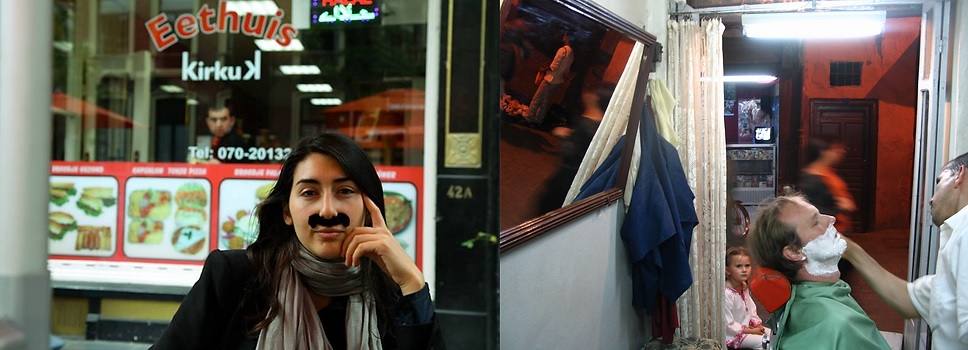Convenor Julia Rone reflects on the very relevant and poignant conference ‘Those who leave and those who stay: the consequences of emigration for sending countries‘ that took place on 26-27 January 2022.

Photo by Marina Velez, from the series ‘Where We Meet: Mapping out the diaspora through photography’
In a world immobilised by the pandemic, our conference ‘Those who leave and those who stay: the consequences of emigration for sending countries’ provided a space for academics and artists (and artist-academics) to discuss the challenges and consequences of mobility from a variety of disciplinary perspectives.
While the field of international migration has explored in depth the topic of immigration, debating its causes, the legal challenges it poses, and the ways it has been politicised in receiving countries, there has been much less focus on sending countries, that is, on how emigration transforms the places and people who are left behind. Our conference was an important step towards re-orienting the field and exploring the multi-faceted impact of emigration at different levels: on personal biographies, art, welfare regimes, economic development, political competition and participation. Our aim was to bring together scholars from different parts of the world, with different personal stories and theoretical contributions, to voice concerns that often remain marginalised or overlooked in contemporary academic debate. After two intense days of rich discussions, we can safely claim we succeeded in amplifying the perspectives and concerns of sending countries.
The two days of the conference were each opened by a strong keynote. On the first day, Professor Susan Robertson (University of Cambridge) posed key questions around the notion of academic mobility – when and how did it become necessary for academics to be on the move? How do demands for academic mobility impact scholars, depending on their gender and socio-economic situation? When is mobility a privilege and when a burden? And can we even decide whether we want to be mobile or is mobility something imposed by a market aiming at frictionless functioning even at the expense of the humans driving it.
On the second day, Professor Olga Onuch (University of Manchester) presented the MOBILISE project with its rich data on ‘exit’ and ‘voice’ and determinants of protest behaviour and/or emigration. The presentation managed to bring unprecedented clarity to a long debate in the field of social movements studies, and political science, more generally, and helped us understand much better the socio-economic profile of both those who leave and those who stay to protest (or are interested in neither):
Who cares?
A series of ethnographic contributions in our first panel outlined how emigration transforms relations of care. Who steps in and cares for young children and for elderly parents, when the main bread-winners emigrate abroad? What are children’s views on their parents’ migration and what coping strategies do individuals and communities develop in settings where outmigration has become a symptom (and potentially a contributing factor to) a permanent economic crisis, but also a crisis of care, trust and a sense of security. While emigration is often thought at the individual level, the contributions to the first panel of the conference used rich survey and ethnographic data to paint a more complex picture of what emigration means for the community and what strategies communities develop to cope with outmigration.
What are emigration’s socio-economic impacts?
Debates on transformations of care, of feelings of belonging or abandonment, as well as of empowerment, were followed by two panels exploring the socio-economic effects of emigration at the country level but also at the level of individual experience. Contributions to these panels explored how individual experience abroad allowed students as well as entrepreneurs to bring back important experience to their home countries, transforming fields such as legal studies, medicine, agriculture or entrepreneurial cultures. Migrant experience abroad was also found to influence in important ways migrants’ attitudes and preferences with regard to different types of taxation in their home countries. Of course, transfer of experience, knowledge and preferences is not always unproblematic: the contributions to the third panel showed well how female outmigration in Turkey in the 1960s-1970s was debated in a highly moralised tone as an example of women being ‘unchained’ and ‘untamed’. And more recently, female migrants returning to Kosovo have found it hard and often frustrating to import experience and attitudes acquired during their stay abroad. In short, socio-economic impacts are often discussed in aggregate, yet, the socio-economic profile, gender and individual experiences of migrants, both in the sending and in the receiving countries, do matter a lot for explaining the types and extent of impact. More research needs to be done on how these factors mediate socio-economic impacts in sending countries.
‘Exit’ or ‘Voice’? It’s more complicated than this?
The fourth panel at the conference explored the consequences of emigration for political participation, from a variety of disciplinary lenses: from political theory to political ethnography and large-N statistical political science. The panel explored novel and interesting questions such as how does out-migration influence vote for the far-right, how do flows of political remittances change in times of local elections, do the political effects of ‘exit’ depend on whether it is highly publicised and mediatised? Ultimately, all papers in the panel questioned and complicated the simple dichotomy between ‘voice’ and ‘exit’, exploring how ‘exit’ transformed the types and ‘tones’ of voice observed, leading not so much to lack of participation as to new forms of participation.
Emigration: a win-win or dependency?
The fifth panel of the conference explored emigration from the perspective of political economy and offered several perspectives on the relation between (forced) emigration and development. Neo-classical economic theories that see emigration as leading to a win-win situation for both sending and receiving states were questioned and an alternative theory of perpetuated dependency was presented. Furthermore, emigration was explored as a sometimes overt, sometimes covert labour market policy by states. Finally, a contribution from the Philippines explored how state education can be used for preparing ’emigrants’. All in all, the majority of the papers in this panel explored states as key actors trying to shape and use emigration, as well as the connection between emigration, labour markets, education and skills development more generally.
Together apart
Finally, the sixth panel of the conference, explored emigration in art, bringing back the voice of emigrants to the fore, as expressed in literature, cinema, and photography. This panel entered into productive tensions and synergies with the previous panels, expanding notions of ‘remittances’ and socio-economic impacts with notions such as ‘literature remittances’. Individual contributions posed key questions about the artistic tropes and figures (in both visual arts and language) used to represent emigration. The photographic series by Marina Velez ‘Where we meet: mapping the diaspora through photography’, for example, placed next to each other images from the lives of family members spread throughout the world, bringing through the photographic lens and montage a sense of closeness, a proximity of experience that defies geographical distance.
In a sense, our conference was a similar moment of bringing together people dispersed all over the world, sharing the same experience: in our case, talking about emigration, debating emigration, feeling emigration. And while the conference has long gone, most of the questions it raised are still open, with the debates hopefully reverberating through our future works.
*The full conference programme can be found on the conference page.

Photo by Marina Velez, from the series ‘Where We Meet: Mapping out the diaspora through photography’

